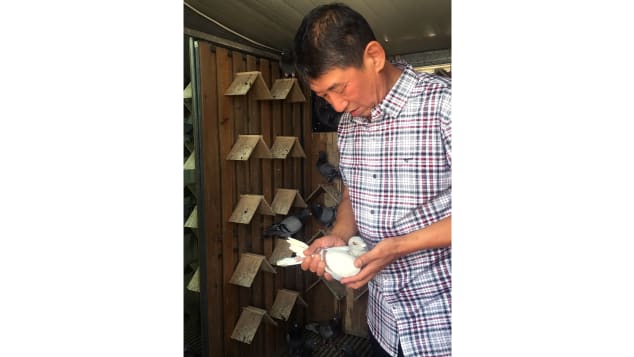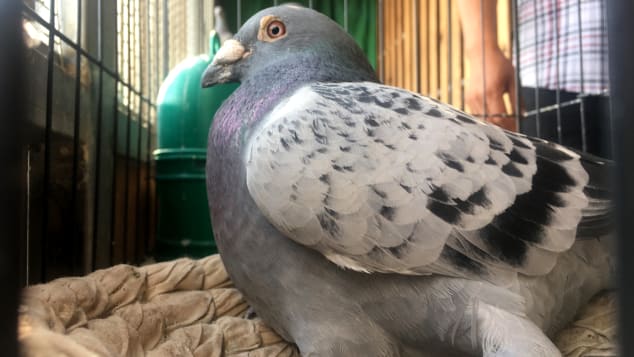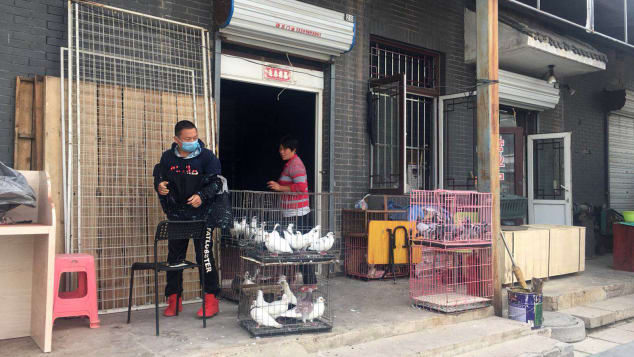Inside the fascinating and sometimes brutal world of pigeon racing in China
Every day during the racing season, 55-year-old Zhang Yajun wakes at 4 a.m. and carefully loads bamboo cages containing his 76 cherished racing pigeons into a van. Then he drives up to 200 kilometers (124 miles) from his Beijing apartment to release them.
They are in training for the October and November racing season, during which time millions of dollars can be won in total prize money across races.
Zhang is just one of some 100,000 pigeon breeders living in Beijing, according to Sun Yan, the deputy general-secretary of the Beijing Changping District Racing Pigeons Association.
"Pigeon racing is a culture, but it's also a sport," Sun says.

Zhang Yajun is one of 100,000 pigeon breeders lliving in Beijing.
Karoline Kan for CNN
The big money involved was evident when a prized Belgian racing pigeon named Armando was recently sold for $1.4 million to a Chinese bidder.
Armando is considered the best long-distance racing pigeon "of all time," according to PIPA, the website that organized the sale. The bird, dubbed the Lewis Hamilton of racing pigeons, sparked a bidding war between two Chinese fanciers.
"It's a tiring hobby," Zhang says. "But once you have started it, you just become addicted."
China the 'hottest place' for pigeons
Pigeon racing for money was first recorded in the later years of the Ming Dynasty, which lasted from 1368 to 1644. As the sport became popular, European pigeons were imported to China.
But in the subsequent Qing era, which ended in 1912, it was banned because the nation's rulers feared that organized groups -- even pigeon fanciers -- might get together and plot regime change.

Pigeon racing was revived across China in the 1930s.
Karoline Kan for CNN
It was not until the republican era in the 1930s that pigeon racing was revived in the British concession of Shanghai. Associations of racers and breeders were founded in almost every city across the country, and the sport evolved into a rich man's hobby.
"Beijing's pigeon races are the most professional ones in China," says Sun. "Although Europe is the birthplace of modern pigeon racing ... China has become the hottest place for pigeon racing, with the most money flowing in. With money, nothing is impossible."
Racers either send their pigeons to a club for collective training or, like Zhang, train them individually.

Zhang Yajun wakes early, driving many miles to train his birds.
Karoline Kan for CNN
On race days, trucks laden with cages transport the birds hundreds of miles before they are released. When they arrive home they stamp on an electronic board before entering a pigeon loft, and a message is automatically sent to the race organizer.
Names of the fastest birds are announced over the internet, with the organizer paying out the successful owners.
It costs just a few dozen yuan to enter each bird but wealthy owners register as many pigeons as possible to increase their chances of a prize. A small-time pigeon fancier on a limited budget, such as Zhang, carefully selects a few dozen birds.
Not a cheap sport
On a crisp fall morning, Zhang opens the cages in a cornfield at Niutuo in Hebei province, 80 km (50 miles) south of Beijing. Forty minutes later, he uses his phone connection to a rooftop camera to watch the birds arriving home. He's happy with their speed.
Zhang, who was a state-owned beverage factory manager before retiring in the early 2000s, says he spends about 100,000 yuan ($14,900) a year on his pigeons. That covers food, medicine, race entry fees and transport costs for training sessions -- as well as equipment such as his rooftop camera gear.
He doesn't keep count of his expenses or prize money. "But overall, I know I lost money. Most people lose money," he says.

Pigeon racer Zhang Yajun buying medicine for his birds. The costs of keeping pigeons can be extensive.
Karoline Kan for CNN
Zhang lives on the top floor of an old residential compound near Beijing's Second Ring Road. He installed a skylight to provide access to the roof and his 10 square meter (107 square feet) pigeon loft.
The birds he keeps are part-descended from foreign breeds -- mainly from Belgium and Holland -- and are bigger and stronger than the Chinese pigeons which people used to keep as pets.
Each spring, Zhang says, some 100 pigeons are born on his roof but by fall only about 20 are left. The rest have either succumbed to illness or died of injuries suffered from hitting telegraph poles or other obstacles. Or else they just got lost on the way home.
His favorite is a bird born in 2004, which he named The Glorious Tang Dynasty and which finished seventh in a 350 km (217 mile) race in Beijing in 2011. He has since retired the prizewinner as a breeding pigeon.
"The most exciting thing about this sport is that it's full of uncertainties," says Zhang. "You never know what superstar you might have the next year -- and your best birds might get lost or killed on the way, even during a race.
"It's a sport that makes people jealous, bitter, happy and ambitious. Those mixed feelings make the sport charming."

A pigeon seller in Beijing. The sport is big business -- a Chinese bidder recently paid $1.4 million for a prized racer.
Karoline Kan for CNN
But pigeon racing also has a darker side.
Zhang says "bird-napping" -- when pigeons are baited and netted during training sessions before being sold off -- is a common problem.
And then there is the cheating.
In April last year, two men hid their birds in milk cartons and caught a bullet train in Henan before releasing them in Shanghai, 750 km (466 miles) away. But the birds' unusually fast speed aroused suspicion, and the men were fined and given suspended three-year prison sentences for fraudulently obtaining prize money totaling about $147,000.
Troubles ahead
Beijing is becoming less and less friendly to bird fanciers.
In the spring of 2017, under a city beautification campaign targeting two-story buildings in the lanes known as hutongs, many rooftop pigeon lofts were subsequently demolished.
The government classified them as illegal buildings.
Breeder Zhang Jian says four large pigeon cages on his roof were demolished, although he still surreptitiously keeps four other cages housing about 100 pigeons. Most of his neighbors have known Zhang Jian since he was a boy and he says they understand his passion for the birds.

Zhang Jian proudly displays the trophies he has won from pigeon racing
Karoline Kan for CNN
Zhang Yajun says he can relax for now since the demolition campaign hasn't yet been extended to apartment compounds like the one he lives in.
"What could I do? Beijing's development has squeezed out the beautiful birds. Pigeons could only live in illegal buildings today," says Zhang Yajun.
"Who knows how long all this can last?" he says, lighting a cigarette on the roof of his six-story building. "Beijing is too crowded even for people, so who cares about the birds?"\
News Courtesy: www.cnn.com











